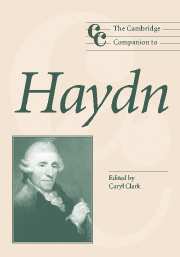Book contents
- Frontmatter
- Part I Haydn in context
- Part II Stylistic and interpretive contexts
- Part III Genres
- 7 Orchestral music: symphonies and concertos
- 8 The quartets
- 9 Intimate expression for a widening public: the keyboard sonatas and trios
- 10 Sacred music
- 11 The sublime and the pastoral in The Creation and The Seasons
- 12 Miscellaneous vocal genres
- 13 Haydn in the theater: the operas
- Part IV Performance and reception
- Index
7 - Orchestral music: symphonies and concertos
from Part III - Genres
Published online by Cambridge University Press: 28 September 2011
- Frontmatter
- Part I Haydn in context
- Part II Stylistic and interpretive contexts
- Part III Genres
- 7 Orchestral music: symphonies and concertos
- 8 The quartets
- 9 Intimate expression for a widening public: the keyboard sonatas and trios
- 10 Sacred music
- 11 The sublime and the pastoral in The Creation and The Seasons
- 12 Miscellaneous vocal genres
- 13 Haydn in the theater: the operas
- Part IV Performance and reception
- Index
Summary
During the span of almost forty years that Haydn wrote symphonies, the nature of the genre changed dramatically, from a type of composition that served various musical and social functions of the ancien régime to a highly defined genre that would stand at the center of musical life for the next two centuries. New concert societies late in the eighteenth century broadened the class-base of the symphonic audience, and Haydn proved extraordinarily adept at making the transition. Throughout his career he gradually reshaped the nature of the symphony, and in the end provided an enduring model for future practitioners of the genre. Symphonies teemed in Vienna during the mid-eighteenth century, and composers such as Matthias Monn, Wagenseil, Dittersdorf, and Hofmann provided much originality. Nevertheless, we owe the emergence of the symphonic tradition primarily to Haydn, and even major composers of the twentieth century, Prokofiev among them, have acknowledged that debt. As a composer of concertos Haydn's achievements are less striking, although because of the prominence of the symphonies we tend to underestimate the concertos.
Because Haydn's symphonies still speak to us with a relevance that has traversed two centuries, we sometimes forget that in the eighteenth century vocal music was considered pre-eminent. With opinion such as this as the common currency, it should not surprise us that Haydn, in his autobiographical sketch from 1776, listed only vocal works among those he considered his finest. Late nineteenth-century writers such as Eduard Hanslick contributed to another misconception about eighteenth-century symphonic works, in their insistence on these as absolute or pure music.
- Type
- Chapter
- Information
- The Cambridge Companion to Haydn , pp. 93 - 111Publisher: Cambridge University PressPrint publication year: 2005
- 26
- Cited by



